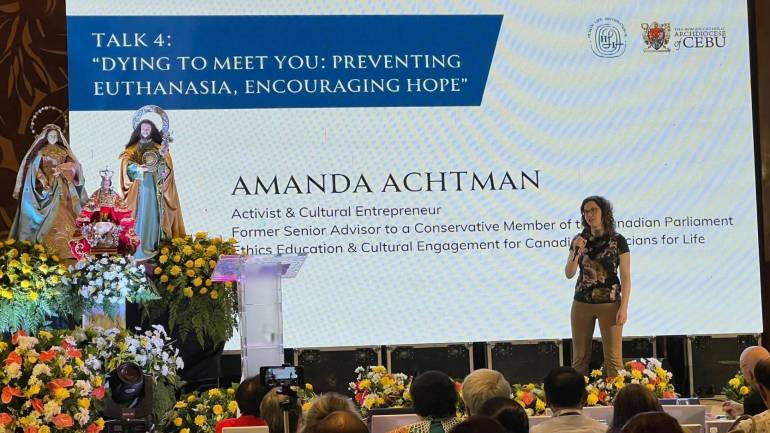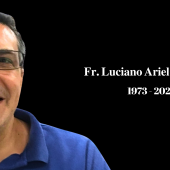Philippines: Canadian Activist Warns Non-Euthanasia Societies and Countries: Do Not Stray Down This Path

The dire warning was issued by a young Canadian activist and former advisor to a conservative member of the Canadian Parliament, Ms. Amanda Achtman, during the 23rd Human Life International Asia Pacific Congress held in Cebu City last year (November 24–26).
Ms. Achtman presented “Dying to Meet You: Preventing Euthanasia, Encouraging Hope”. The congress theme was lifted from the book of the prophet Hosea (4:6), “My People are Destroyed For Lack of Knowledge.”
During an interview with Radio Veritas Asia RVA, Ms. Achtman estimated that doctors and nurses have killed approximately 50,000 people in homes and hospitals in Canada, surpassing the death toll of COVID-19 in her country.
She described Canada as the “euthanasia capital of the world.”
Euthanasia became legal in Canada in June 2016. The legal, voluntary form of euthanasia is called Medical Assistance in Dying, or MAID in abbreviated form. It became legal, along with assisted suicide, for those whose deaths were reasonably foreseeable.
On February 2, 2023, Canada introduced a law to extend the exclusion of eligibility in circumstances where a person’s sole underlying medical condition is a mental illness for one year until March 17, 2024.
Since the time of Pope John XXIII, Pope Paul VI, and Vatican 2, the Church has stood foursquare against euthanasia.
In the Conciliar Constitution Gaudium et Spes (GS 27), euthanasia is included in the list of “infamies” that are “opposed to life itself.”
Moreover, in the 1995 encyclical Evangelium Vitae, St. John Paul II was prophetic when he said that euthanasia, “disguised and surreptitious, or practiced openly and even legally,” was becoming more widespread.
He wrote that euthanasia is sometimes justified by the utilitarian motive of avoiding costs that bring no return and which weigh heavily on society.” The Polish pope noted that “euthanasia is one of the more alarming symptoms of the ‘culture of death’.”
Ms. Achtman said euthanasia is an urgent and pressing moral crisis. She encouraged societies and countries that have not legalized euthanasia “not to stray down this path” because once it becomes legal, euthanasia will not remain limited.
Based on the Canadian experience and other countries that have tried euthanasia, it has been found that once legalized, it will always be expanded.
“As soon as it is seen as a good, then it will be expanded, and there’s no one who should be excluded from this expanded relief, so euthanasia will not be limited.”
According to Achtman, “Euthanasia also undermines suicide prevention and self-harm prevention. This is why it matters to all generations, including young people.”

The message that euthanasia sends is that “the way of suffering is not resilience and accompaniment in community but death.”
“We can never allow death to become the solution to suffering. We need each other, we need community in our lives, and we need better stories so that we truly have another vision of another better way to live and to die.”
When asked what led Canada to legalize euthanasia, Ms. Achtman pointed to the lobby group “Dying with Dignity” as one of the main drivers of euthanasia in her country. Other groups have similar names, adding that the “abuse of language has led people to see euthanasia as something so positive and attractive, even dignified.”
“Equating euthanasia with dignity is sinister because it presumes natural dying to be undignified, which is really a shame. Because nobody should be ashamed of dying naturally. It is natural, it takes place, and it is painful. We have all experienced loss. Dying is not something we can have complete control or mastery over.”
Asked what led her to advocate for the culture of life and hope, Ms. Achtman said she owes it to her grandfather, who lived with her family while she was still in high school—an unusual situation in Canada to be living in an intergenerational household.
“His presence with us in our home was transformative for me. When you have an elderly person living with you, you have to adapt; you have to be more patient. It calls you out of yourself, especially if you’re a teenager.”
Ms. Achtman’s grandfather lived with her family at age 89. He passed away seven (7) years later.
Asked to comment about the significant number of Filipinos living and working in Canada, Ms. Achtman said she appreciates Filipinos and what they bring to their culture to enrich Canadian society.
She said that Filipinos should cherish their culture because it contributes to the integral human development of a person.
“The person is irreducible; it is such a tremendous, inexhaustible gift and so we must safeguard the image of God in man.”- Malou Guanzon Apalisok
Radio Veritas Asia (RVA), a media platform of the Catholic Church, aims to share Christ. RVA started in 1969 as a continental Catholic radio station to serve Asian countries in their respective local language, thus earning the tag “the Voice of Asian Christianity.” Responding to the emerging context, RVA embraced media platforms to connect with the global Asian audience via its 21 language websites and various social media platforms.














